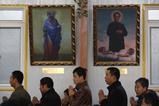What’s in a word? Time and again, Christians have divided over one single word, says Chris Goswami. Whether it’s a reference to the virgin birth, mentioning the Father and the Son in the creeds or how we talk about same-sex relationships today, is there a better way?
![]()
In the 1950s, thousands of Christians were outraged by a new translation of the Bible. There were protests and reliable reports of Christians burning Bibles and sending the ashes back to the publisher.
The Bible at the heart of this uproar was not some radical reinterpretation; it was the Revised Standard Version (RSV). Why would Christians protest over - and even consider burning - the RSV?
The reason for all this anger? The answer lies in a single verse - in fact a single word.
In Isaiah 7:14 the RSV reads: “Therefore, the Lord himself will give you a sign. Behold, a young woman shall conceive and bear a son, and shall call his name Immanuel.”
For comparison, in the NIV the same verse reads: “Therefore, the Lord himself will give you a sign: the virgin will conceive and give birth to a son, and will call him Immanuel.” (Italics added)
The RSV translates the Hebrew word almah as “young woman”. It is a literal rendering, referring to a young woman of marriageable age who has not yet had children - a ‘maiden’ we might say. The NIV (and the much earlier King James version) does an equally good job, using ‘virgin’, emphasising the prophetic nature of the verse concerning Jesus.
Words and doctrine matter, but one thing matters more
Today the NIV enjoys widespread popularity, while the RSV and the NRSV are far less popular. According to Ron Rhodes’ The Complete Guide to Bible Translations (Harvest House) there is even an Isaiah 7:14 litmus test used by some as “the quickest way of determining if a new translation is trustworthy”.
In fact, the meaning of almah most likely changed over the centuries, as often happens. And to give both versions their due, the NIV and RSV both include footnotes referencing this dual meaning.
The son of God
In the eleventh century, another word precipitated the great schism in the worldwide Church.
Following on from the early believers in Acts, the Church was, at that point, a united and growing institution. It became the official religion of Rome in the fourth century and developed two influential centres - Rome in the west and Constantinople (Istanbul) in the east.
Both cities developed their own traditions and used their own languages; Rome is Latin and Constantinople is Greek. They had religious and political disagreements, ranging from the authority of the Pope to what kind of bread to use at communion. However, they agreed on what they believed, as written in the creeds.
The reason for all this anger? It was a single verse, in fact a single word in Isaiah
But tensions grew until, in 1054, the worldwide Church broke into two: the Western Church (Catholic and later Protestant), and the Eastern Church (Orthodox). And the straw that eventually broke this camel’s back was one word: filioque, meaning “and the Son”.
The opening statement of the creed read: “We believe in the Holy Spirit, the Lord, the giver of life, who proceeds from the Father”. This was then altered by Rome, despite Constantinople’s objection, to: “We believe in the Holy Spirit, the Lord, the giver of life, who proceeds from the Father and the Son”. (Italics added)
The result? The Church broke into two. But both sides were not equal. The Western Church had power and wealth, the Eastern church much less so. Historians argue that this imbalance and division opened the way for Islam to spread across the Middle East and North Africa, which were predominately Christian until then. It’s worth observing, for example, that the seven named cities of Revelation are all Islamic today.
Sex and sexuality
It’s easy to look back and wonder why people couldn’t agree to disagree, but are we not the same? What word do you think could break Church unity in this century?
No prizes if you chose ‘same-sex’ - or something similar. (OK, that’s technically two words, but if you look carefully, I inserted a hyphen!)
This year, we’ve seen how fractured the Anglican Church has become over same-sex relationships and marriage. In my denomination, the Baptist Union has held lengthy consultations on the impacts of removing the strict, traditional definition of marriage from the “code” that ministers sign up to.
Across the Church of Scotland, the Methodist Church, the Church of Wales – and many other denominations – similar discussions have or are taking place. No matter the outcome, there are groups of people threatening to leave, or who have already departed.
Of course, the issue of same-sex relationships is not just about semantics. But I know people who have left churches simply because a discussion on the issue was tabled. Like others, I hold a view on the issue that is very important to me. But I also have another view: I might be wrong…and that’s OK.
The Word
Words and doctrine matter, but one thing matters more. When Jesus, the authentic Word, commanded that we love one another, he said that would be how the world knows we are his followers (John 13:35).
We will not be identified by being doctrinally sound or getting all our words right. We won’t even be identified by being able to quote his words (which are really important). Ultimately, it’s our unity that marks us out.
Often, we confuse unity with agreement. Christian unity means we subscribe to core, gospel-centric beliefs as written in the creeds (thankfully no longer out for edit!) On every other matter, we can respectfully disagree, continuing to work together in love and fellowship.





































No comments yet